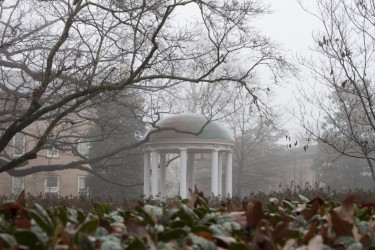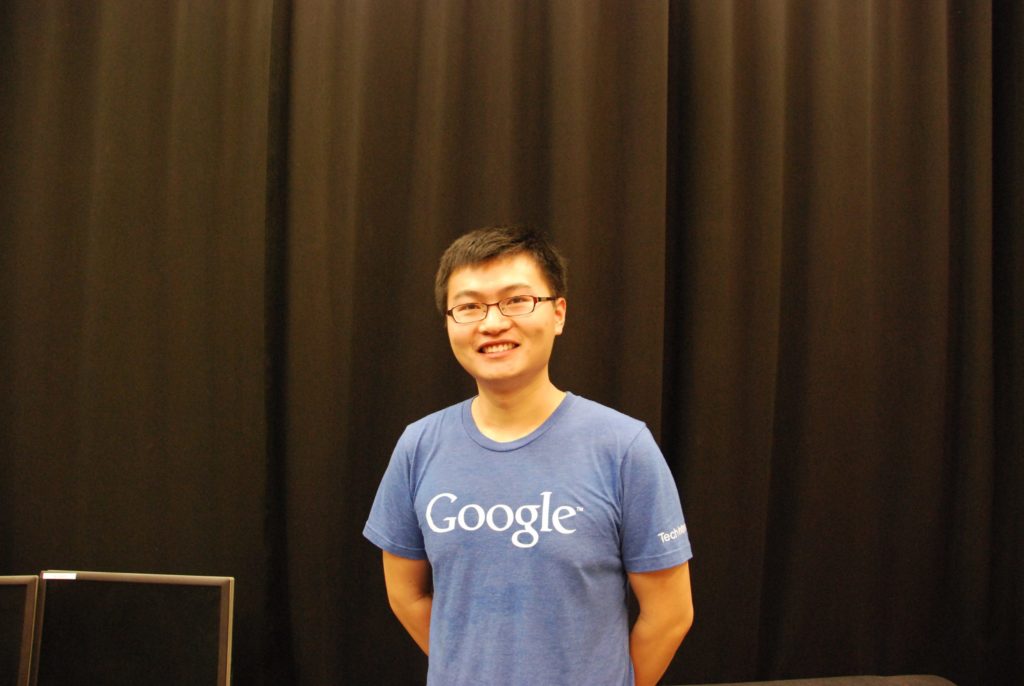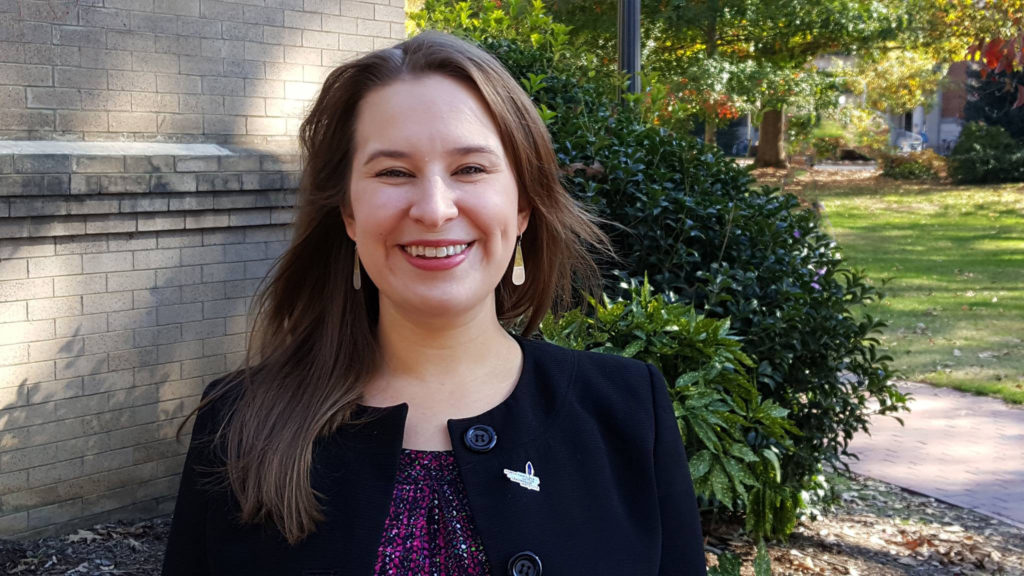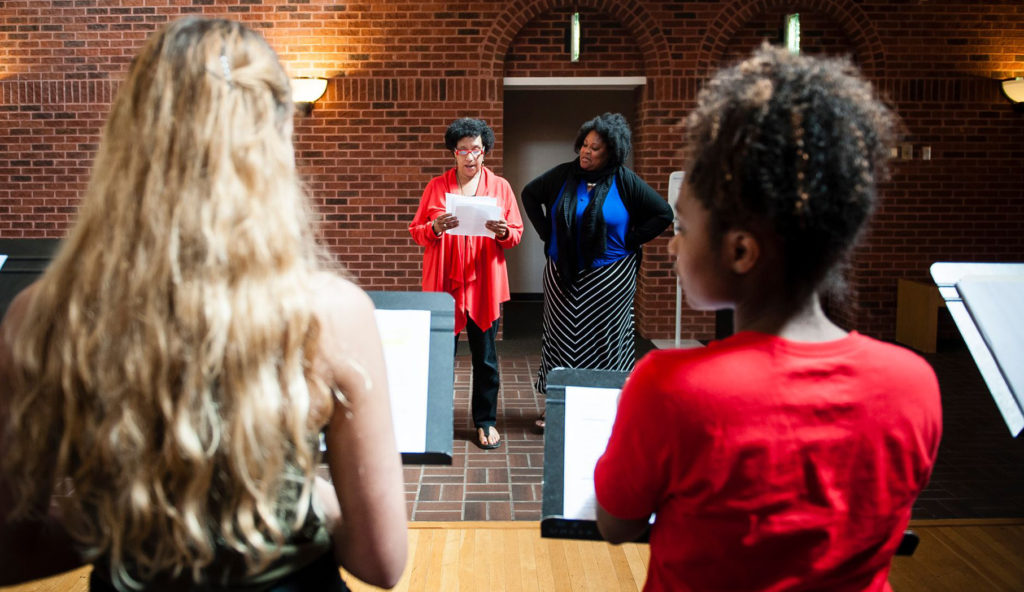
UNC assistant professor of dramatic art and playwright Jacqueline Lawton has always had an appreciation for the crossroads of art and science, a theme that repeatedly finds its way into her work.
“For me science is a natural connection to the arts and to playwriting because it’s about discovery,” said Lawton, who is also a dramaturg for PlayMakers Repertory Company. “I grew up in a farm community in east Texas, and I was always digging around in the dirt and exploring the world around me. Even now, I look out my window and see the luscious, gorgeous green. It’s science, but it’s also art. When I write plays, it’s always in response to a connection about the world.”
A staged reading of her latest one-act play, ARDEO (Latin for “to burn”), will be showcased May 14 and 15 at the UNC School of the Arts and UNC-Chapel Hill. In partnership with Bruce Cairns, chair of the faculty and director of the North Carolina Jaycee Burn Center at UNC Hospitals, and with support from an inaugural Kenan Creative Collaboratory Grant, she will tell the stories of burn survivors and their care providers — chaplains, nurses, doctors, social workers and family members.

Stories like burn survivor Sharon Thompson-Journigan’s:
“My burns are the result of domestic violence, which led to me being set on fire at the age of 23. At this time in my life, I was already struggling with self-esteem issues. When I got burned, they took me to the hospital in Lumberton, but my burns were so severe. The next thing I remember was that my family was around me. I thought I was dying. Next thing I know, I woke up at UNC-Chapel Hill. My brother was standing over me, and he reminded me about my son, Brandon, and baby girl, Trina. He said, ‘You’ve got to live.’ … The [Burn Center] team was so supportive. I never had anybody say you are beautiful and smart. They empowered me.”
Thompson-Journigan went on to receive her bachelor’s degree in social work from Shaw University and is working on a master’s in divinity degree from Campbell University. She also started a church, Integrity Ministries, which has attracted young people around the same age she was when she almost lost her life. The phrase “I’m Over It” and the verse Philippians 3:13 in her email signature are a motto for her journey: “Brothers and sisters, I do not consider myself yet to have taken hold of it. But one thing I do: Forgetting what is behind and straining toward what is ahead.”
Stories like burn survivor Conny Morrison’s:
“A couple of weeks before I was supposed to go to college in Massachusetts, I was making doughnuts and the grease caught on fire; when I was in the process of trying to put it out, grease splattered on my arm and foot. I was burned on only 4 percent of my body, but I was hospitalized at the Burn Center to undergo two surgeries on my arm, hand and foot. I almost didn’t make it to college that semester but I was really determined to go, so Dr. Cairns communicated with my school, allowing me to start that fall. At the time, it was hard, but I feel really lucky because you see what you can live through. You feel strength and confidence in overcoming a difficult experience.”

During her undergraduate career, Morrison traveled to Uganda where she worked with burn survivors in Kampala. She also volunteered at burn survivor camps in North Carolina for children, teens and families. She will begin medical school this fall at UNC.
Stories like Burn Center chaplain Shirley Massey’s:
“I grew up in Virginia in a family of seven children. We were farmers, and my dad worked in a cotton mill. The church became the center of my world, and I grew in my relationship to God. I was one of the only ones in my family to go to college, to Averett University in Danville, Va. I graduated with an undergraduate degree in religion and philosophy and later went on to earn a master’s of divinity degree through the Southeastern Baptist Theological Seminary. I’m ordained as a minister and board certified through the association of professional chaplains. … In Matthew 7:7 it says ‘Knock and the door shall be opened, seek and you shall find, ask and you shall receive.’ That’s been my philosophy of life. I moved into this, and it became a great fit. I’ve mentored a lot survivors. To recover from a burn injury is a life journey.”
Massey has been a chaplain at the Burn Center for almost 30 years. She directs the Center’s Adult aftercare programs which include the annual adult reunion and adult retreat and supervises the peer support program. She just hosted her 15th burn survivors’ retreat and in November will host the 25th reunion. In early 2000, she worked with the Phoenix Society, the national support organization for burn survivors, on developing a peer support program called SOAR (Survivors Offering Assistance in Recovery). Both Thompson-Journigan and Morrison have volunteered with SOAR.
Stories and the healing power of narrative medicine
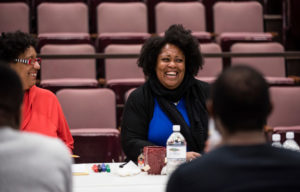
Lawton said she learned through Cairns and her interviews with burn survivors and care providers that burns are a great equalizer. “They impact you no matter who you are in terms of race, religious, class or age. It doesn’t matter.”
She believes in the power of narrative medicine — the idea of patients telling their stories, listening to their bodies and becoming empowered in their journey toward recovery. And theater is the perfect venue for that to happen, she said.
“With theater, we are capturing stories and lifting them up,” said Lawton, who teaches classes in playwriting and theater for social change. “We know that theater is a great place to bring communities together, and it’s a great place to raise awareness around issues, to offer information and a space where debate can happen and we can talk about what’s right and wrong. Theater is powerful because we’re able to examine the human condition, and there is such potential for empathy.”

Nicole Damari is a first-year-medical student at UNC with a long-standing interest in theater. She took Lawton’s playwriting class last fall, became interested in her ARDEO project, and offered to help conduct some of the interviews for the play. Learning about burn survivors’ stories, particularly their relationships with their health care providers, was a valuable experience as she develops her clinical skills, Damari said.
“Having the opportunity to work at the intersection of medicine and the arts and to work on a social justice issue that will hopefully reduce stigma and improve health outcomes for people who have experienced burn injuries — that really drew me to the project,” Damari added.
Cairns said the ARDEO project is a great example of collaboration with the College of Arts and Sciences, and he hopes it will be a springboard for other ideas.

“Sometimes it’s only through the arts and humanities that one can express what it means to be human, experience a burn injury and then live as a burn survivor,” he said. “In addition to dramatic art, we’ve worked with other units including the African, African American and Diaspora Studies department on burn center work we are doing in Malawi. I strongly believe it is important to work with other units across campus, and especially with the College because it has so much to offer. It’s through these experiences that we fully understand and can successfully address the biggest problems in society.”
The free staged reading and post-show discussion of ARDEO will be performed at the UNC School of the Arts’ Catawba Theatre May 14 at 7 p.m. and at UNC-Chapel Hill’s Kenan Theatre in the Center for Dramatic Art May 15 at 3 p.m. UNC School of the Arts students will be featured in the performance, which will be directed by UNC dramatic art lecturer and PlayMakers Repertory Company member Kathryn Hunter-Williams.
By Kim Weaver Spurr ‘88, UNC College of Arts and Sciences

